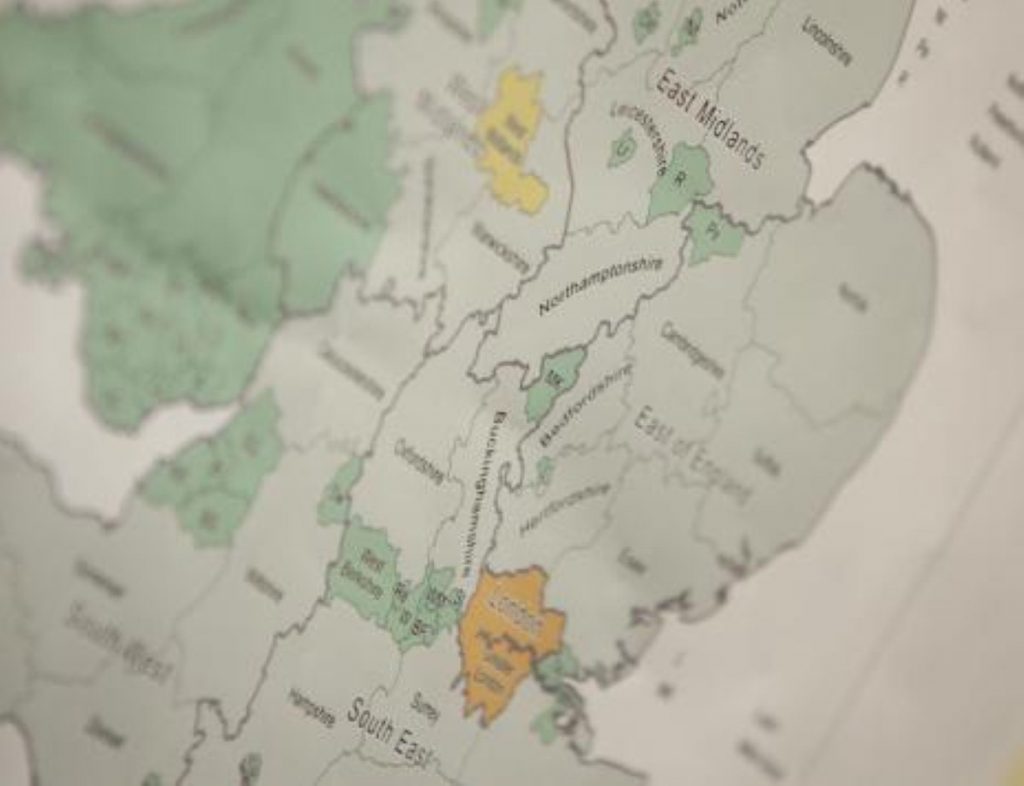Battle begins over UK’s new political map
By Alex Stevenson Follow @alex__stevenson
Redrawn constituency boundaries have been published, triggering a fight for survival among MPs as the Commons prepares to cut its size from 650 to 600.
The changes are much greater than under previous boundary reviews because of the decision to regularise the size of constituencies, which can now have a minimum of 72,810 voters and a maximum of 80,743.
Many backbenchers will find themselves going up against another MP from their party as a result of the changes, triggering a backroom contest which will have to be decided internally.


Other constituencies are being dissolved entirely, with their wards split into newly-created seats.
Senior politicians have not escaped the changes. Cabinet ministers George Osborne, Kenneth Clarke and Nick Clegg all face substantial changes to their constituencies. Vulnerable opposition figures include Ed Balls, Hilary Benn and Tessa Jowell.
Business secretary Vince Cable's Twickenham seat has been split in half. A new Twickenham and Richmond seat, which he may have to contest against Tory MP Zac Goldsmith, spans the River Thames.
Mr Cable is the most senior member of the government to hit out against the changes.
"In order to get the right size of constituency, no account has been taken not just of borough boundaries, but any sense of identity. That will cause a lot of concern," the Evening Standard newspaper quoted him as saying.
Simon James, secretary of the Boundary Commission for England, which has published its proposals today, insisted that the newly-imposed limitations on the number of voters in each constituency had effectively tied the commissioners' hands, however.
"Parliament has set clear rules on what we can and can't do when it comes to developing our initial proposals," he said.
"BCE was given clear principles and from that starting point we have found a solution that we think best meets parliament's rules and now we want to know what people think of our initial proposals."
Traditional factors like local ties and geographical features, normally prominent in boundary commissioners' thinking, have had to be reduced in importance to fit in with the changes.
"Parliament has set clear rules on what we can and can’t do when it comes to developing our initial proposals," said Simon James, secretary of the Boundary Commission for England, which has published its proposals today.
"BCE was given clear principles and from that starting point we have found a solution that we think best meets parliament's rules and now we want to know what people think of our initial proposals."
The reduced 'coterminosity' between local council and parliamentary areas has been criticised by the Local Government Information Unit thinktank.
"The proposed changes will mean that parliamentary constituencies cross more council boundaries and this will make democratic representation more complicated and confusing in some areas, not just for elected representatives, but also for the voters," chief executive Andy Sawford commented.
"There is often a strong sense of identity, arising from history and logical geographic boundaries in many constituencies, and voters might well be confused by some of the proposed new arrangements, which stretch local links.
Labour has repeated its "gerrymandering" claim against the Conservatives and Liberal Democrat coalition over the changes, which were passed into law alongside the alternative vote referendum.
"We have serious concerns about the government's decision to change the boundaries, which we believe was an act of gerrymandering by the Conservative party," Ed Miliband said.
"However the Labour party now intends to take time to examine the initial proposals before making our formal response."
Bookmaker William Hill made Labour the new favourites to win the general election after the changes, however, suggesting the opposition's gloom may be misplaced.
Political party strategists have spent the summer preparing for the 12-week consultation process on the proposed changes in England. Public hearings will take place in England from October 11th to November 18th this year.
At the end of their respective consultation periods the boundary commissions will consider any counter-proposals submitted by the parties.
These will be published, giving those who oppose them an opportunity to rebut them. The boundary commissions will then make a final decision.
But even then the changes will not definitely go ahead. Parliament will have to approve the finalised alterations by October 2013 at the latest, prompting some to speculate that dissent from MPs left without a seat could trigger the early collapse of the coalition.

